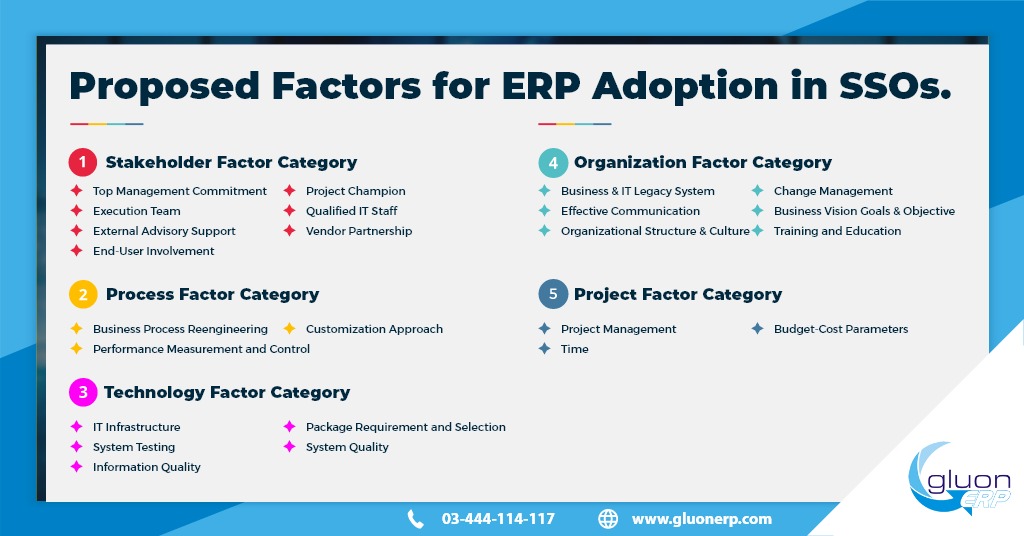
Proposed Factors for ERP Adoption in SSOs
SSO means Single Sign-on (SSO), and it is an authentication process, which gives user access to multiple
applications using one set of login credentials. Most enterprises often use SSO to give their clients access
to multiple resources on their systems. So At Gluon ERP, we make sure you understand what factors can
affect the ERP implementation and adoption. Here are five major factors to consider while erp adoption and implementation.
Stakeholder Factor Category
This includes aspects that will make managing the stakeholders easier using the ERP. This category
involves the following:
- Top Management Commitment – The management must be committed to using the ERP after its
implementation. Since the ERP centralizes all the information, the management should be able to
access all stakeholder details centrally. - Project Champion – This individual takes the burden of making sure that everyone on the team is
involved and behind the success of the specific project. This person would be responsible for
outlining the strategic objectives of the project. - Executive Team – This comprises of high-ranking employees who work together to manage the
company. They oversee the daily operations to make sure there are efficiency and customer
satisfaction. - Qualified IT Staff – A qualified staff is like the heart of the enterprise. These people ensure the
stability and growth of the company. - External Advisory Support – This means there would be a strong connection in industry advisory
bodies to align and inspire the company’s staff with the emerging trends in the industry. - Vendor Partnership – Stakeholders will have to know about all the vendor partnerships with
transparency. - End-user Involvement – This means optimization of the technology used in the enterprise to manage
how they work with the ERP.
Process Factor Category
In order for the ERP adoption in SSO to be successful, here are some things that would be required.
- Business Process Reengineering – Upon the new ERP adoption, there will be a transition
process where the business process would need changes. - Customization Approach – The team will have to plan the customization approach to make sure the
ERP implementation and adoption happens smoothly. - Performance Measurement and Control – At different stages of the ERP implementation, the
managers will have to evaluate performance management and control.
Technology Factor Category
IT plays an important role in any enterprise. When the company implements ERP software, the
following must be taken into consideration.
- IT Infrastructure – There will be a need to have the right number of computers, networking, and
other equipment installed to make sure the ERP and SSO work well together. - Package Requirement and Selection – Depending on the services offered to the customer, there
might be a need to define the package requirements and options to select. - System Testing – When implementing the SSO and ERP software, there will be a need to test the
system thoroughly to make sure there are no bugs. - Quality Check – In order to make sure the ERP adoption goes on smoothly, the quality of systems
used must be good enough. - Information Quality – Not just the systems implemented, but the data collected must also be of high
quality without missing or corrupt data.
Organization Factor Category
In this category of factors that influence ERP adoption, you have to consider the following:
- Business IT Legacy System – The legacy system in computing refers to old technology, old methods,
and old applications. They are outdated and still in use in the organization. Evaluate what legacy
systems are in use and how they will adapt to the new ERP. - Change Management – The transition process will require proper management to make sure there
are no issues for the clients. - Effective Communication – During the implementation of a new ERP, the managers must maintain
proper communication. This will help everyone by making sure there is a proper flow of information. - Business Vision, Goals & Objectives – The managers must define the business vision, goals, and
objectives. This helps set up the ERP to align it with the goals and objectives. - Organizational Structure and Culture – The managers must also consider the culture and
organizational structure to set the ERP such that it conforms to these factors. - Training and Education – There will be a need to educate and train the staff and the clients on how
to use the new ERP. Implementing the ERP would not alter the SSO or single sign-on process.
Project Factor
This factor is all about how the following affect the smooth flow of the project.
- Project Management: Upon the ERP adoption, the managers must make sure the project flow
remains as planned. - Time – Managers will have to work with a timeframe to ensure everyone becomes used to the
ERP. - Budget-Cost Parameters – It is important to consider the budget cost parameters so that
implementing the ERP is cost-effective. It is important not to exceed the company’s budget.
We are here to assist with making the ERP software adoption easier with SSOs. Contact us today




Comments